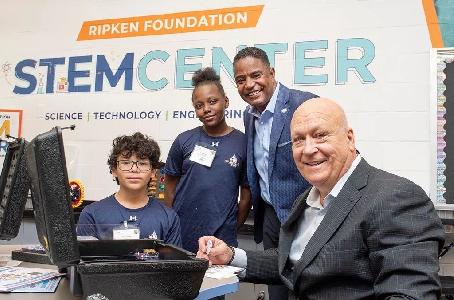
This editorial article is a part of Tech for the Common Good Month of Technical.ly's editorial calendar. This month’s theme is underwritten by Verizon 5G. This story was independently reported and not reviewed by Verizon before publication.
What’s a growing company’s role in the community where it’s based?
It’s a question that has been approached many times over the last year. And it came up again in recent weeks after influential, Chicago-based software company Basecamp recently lost a third of its employees because of a memo banning political speech on the company’s shared workplace software and end “paternalistic” benefits and committees. This introduced a change in philosophy at the company, where work is work and whatever happens outside of work hours stays outside the office.
Amid the rebukes, one message was clear: Companies don’t exist in a vacuum. What happens outside the workplace affects the company. There’s value in recognizing that, from the CEO to the new hire, employees have the ability to impact communities around them.
Once you’re ready to step up, there are plenty of ways to get involved. To offer some real-world examples to learn from, we went to the archives and gathered a few approaches that companies in Baltimore are crafting to contribute to the greater good.
First, one note: In a tech community that counts strengths in health, education and cybersecurity, plenty of Baltimore companies have a mission and product that’s tied to making change in society. And many of the individual leaders of these companies are shaping the city’s future through myriad roles with civic organizations as board members, advisors and more. But take note: With this roundup to kick off Tech for the Common Good Month on our editorial calendar, we’re spotlighting specific initiatives that tech companies started up outside their main business model to contribute in Baltimore over the last year. It’s not exhuastive, but is meant to offer a look at how companies are making local impact. (In fact, if you want to tell us about a project we haven’t covered, email us at baltimore@technical.ly).
Let’s jump in:
Working for equity
At a time when the pandemic shifted a city where 40% of households lack wireline broadband to virtual work and school, CEOs are stepping up as an advocate for digital equity. Take SmartLogic CEO Yair Flicker, who testified in support of Del. Brooke E. Lierman Digital Connectivity Act which led to the creation of Maryland’s new Office of Statewide Broadband. The local software development company also supported 13 Black-led organizations during the summer of civil unrest that followed the deaths of Breonna Taylor and George Floyd, and others who were killed due to police brutality.
When it comes to the on-the-ground work of connecting folks, Project Waves and Rowdy Orb.it are both dedicated to putting technical expertise to work to bring free Wi-Fi to Baltimore neighborhoods. Project Waves uses mesh networks, a process of putting a satellite dish on a home that connects to sector antennas on a tall building in a neighborhood to provide internet. Rowdy Orb.it turns community buildings into Wi-Fi Hotspots by extending the signal radius to within a two blocks of the community building in the neighborhood.
The tagline of downtown digital services agency Fearless is “software with a soul.” By definition, the organization wants to make an impact and use tech to improve their community. That philosophy has led to Hutch, which seeks to grow digital services businesses in Baltimore. The first cohort supported then-Fearless employee Aaron Brooks in creating a company, called Mastermnd, that’s dedicated to “scaling opportunity” and creating the next crop of tech talent so people can use tech to “not only change lives but entire lineages.”
Seeking to spread tech skills and the opportunity that comes with them, Fearless is also supporting youth tech training at six Baltimore nonprofits in 2021. Contributions from the $60K community partners program includes donations, as well as volunteer hours from Fearless employees.
This work on equity has also led to coalition building among the community. Longtime leaders formed Digi Bmore and stood up rapid response efforts when the pandemic arrived. Around the same time, a multitude of Baltimore startups and tech firms got involved with funders and nonprofits as part of the Baltimore Digital Equity Coalition, working to bridge the digital divide in Baltimore and make sure every resident has internet access in this increasingly digital world. And this year, many of the city’s growth tech companies joined a coalition called Baltimore Tracks, which is setting out with hiring process committments to create a more diverse tech workforce. Coalitions have even teamed up: BDEC and Baltimore Tracks joined forces for a job fair focused on diverse talent in March.
Crowdsourced crisis response
Owings Mills-based software company Bellese Technologies allows employees to work on volunteer projects for 12% of their time, and employees like Jason Anton use it to work with Code for Baltimore. That manifested in an open source customer management tool that saved hundreds of hours in human effort for the Baltimore City Health Department. The tool allowed the health department to contact hundreds of senior living centers and respond quickly to their needs during the pandemic.
Open Works, a Station North makerspace where entrepreneurs and creators find tools and resources needed to manufacture physical products, pivoted to making face shields at the onset of the pandemic. The organization mobilized its network to fill a need it saw in the community, and called on folks with a 3D printer at home to help produce materials. In 2021, the same mentality of seeing a need and being a resource to the community manifested in using an open source design to build at-home learning desks for youth in Baltimore.
A company that digs its head in the sand can’t be responsive to the needs of the community and pivot effectively.
Resources for local nonprofits
Sometimes it’s not necessary to reinvent the wheel. Companies can give existing initiatives a new spin. With the shift to remote work, Locust Point-based tech and marketing agency Mindgrub turned a bonding exercise, dubbed the Mindgrub Olympics, into a virtual charity fundraising event called Games for Good,which raised funds for local nonprofit organizations.
And we’ve seen donations directly from companies, like Sparks-based Firaxis Game Studios‘ six-figure contribution to Baltimore computer science education nonprofit Code in the Schools.
It doesn’t have to be a monetary contribution. Mount Vernon-based software and cyber company Nyla Technology Solutions in collaboration with the Baltimore Robotics Center provided laptops to a local middle school via PCs for People, a nonprofit that expanded to Baltimore last year which refurbishes and redistributes laptops.
It wasn’t a huge lift on the company’s part because the infrastructure was there through the nonprofit. All a company needs to do is apply resources or spotlight the appropriate nonprofit working on solutions to community issues.
Working towards the common good can be as beneficial to the company as the community. All it takes is a little initiative.
Donte Kirby is a 2020-2022 corps member for Report for America, an initiative of The Groundtruth Project that pairs young journalists with local newsrooms. This position is supported by the Robert W. Deutsch Foundation.Join the conversation!
Find news, events, jobs and people who share your interests on Technical.ly's open community Slack

Baltimore daily roundup: The city's new esports lab; a conference in Wilmington; GBC reports $4B of economic activity

Baltimore daily roundup: Find your next coworking space; sea turtle legislation; Dali raided and sued

Baltimore daily roundup: Johns Hopkins dedicates The Pava Center; Q1's VC outlook; Cal Ripken inaugurates youth STEM center


